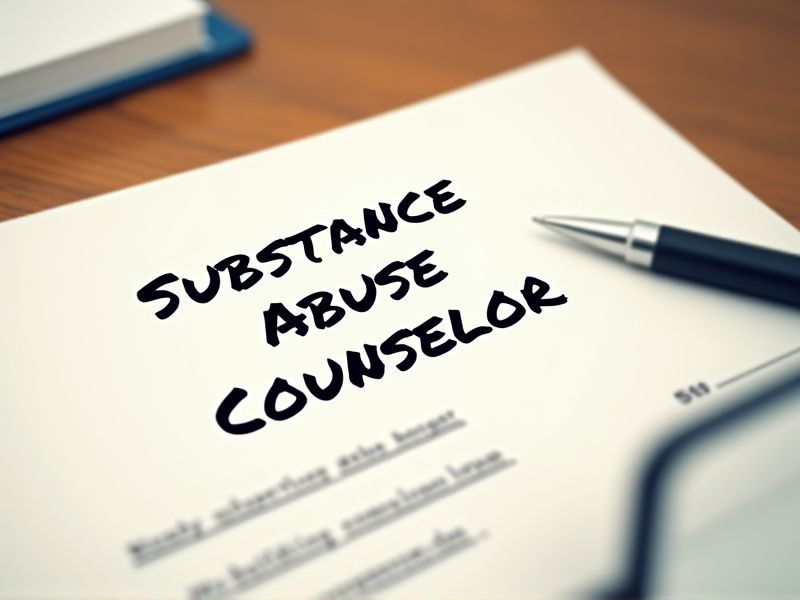
Substance abuse counselors require specific certifications to ensure they possess the necessary expertise to address complex mental health issues linked to addiction. These certifications validate their knowledge in providing effective treatment and support, ensuring they can work ethically and within industry standards. Acquiring these credentials enhances their credibility and trustworthiness with clients and employers alike. Listed below are key certifications essential for becoming a substance abuse counselor.
Certified Alcohol and Drug Counselor (CADC)
The rise in substance abuse cases has increased the demand for qualified professionals, making the Certified Alcohol and Drug Counselor (CADC) essential. This certification ensures that counselors possess the expertise to handle complex addiction issues, ensuring effective treatment. By holding a CADC, counselors meet industry standards, increasing client trust and improving outcomes. Many employers require CADC credentials, leading to greater employment opportunities for counselors.
National Certified Addiction Counselor (NCAC)
The NCAC credential validates a substance abuse counselor's expertise and commitment to adhering to professional standards. Certification enhances the counselor's credibility and reputation, attracting more clients and increasing career opportunities. It ensures that counselors are equipped with up-to-date knowledge and skills to address complex addiction issues effectively. Employers and clients gain assurance in the counselor's ability to provide competent and ethical treatment.
Certified Substance Abuse Counselor (CSAC)
Certified Substance Abuse Counselors (CSAC) bring credibility and assurance of quality to the field, which builds trust with clients and employers. Certification ensures that counselors possess standardized knowledge and skills, essential for effective treatment strategies. Regulatory bodies often require certification to maintain ethical and professional standards in practice. The certification process encourages continuous education, keeping counselors updated on the latest research and intervention techniques.
Advanced Certified Addiction Counselor (ACAC)
The ACAC credential provides substance abuse counselors with specialized training, enhancing their ability to understand complex addiction dynamics and offer effective treatment. With rising addiction rates, a more qualified counselor can better support individuals by using evidence-based strategies and therapies. Insurance providers and regulatory bodies increasingly demand higher certification levels, driving the need for advanced credentials like ACAC. Counselors with ACAC status are better positioned for career advancement, distinguishing themselves in a competitive field by demonstrating a commitment to ongoing education and professional excellence.
Certified Clinical Mental Health Counselor (CCMHC)
The CCMHC designation brings advanced expertise in diagnosing and treating complex mental health conditions, enhancing the effectiveness of substance abuse counseling. Substance abuse issues often coexist with mental health disorders, and a comprehensive understanding is crucial for effective intervention. Counselors with CCMHC certification can integrate evidence-based practices, improving recovery outcomes for individuals facing dual diagnoses. This specialized knowledge helps in developing personalized treatment plans that address both substance abuse and underlying mental health issues.
Certified Peer Recovery Specialist (CPRS)
The involvement of a Certified Peer Recovery Specialist (CPRS) enhances the effectiveness of a Substance Abuse Counselor by offering lived experience insights, fostering a deeper connection with clients. This collaboration provides a robust support network, essential for sustaining long-term recovery, as clients relate better to someone who has faced similar challenges. The presence of a CPRS helps bridge the gap between counseling sessions by offering continued encouragement and motivation. CPRS can also reduce relapse rates by sharing personalized strategies and coping mechanisms, backed by direct experience.
Certification in Motivational Interviewing (MI) Practitioner
Certification in Motivational Interviewing equips substance abuse counselors with evidence-based communication techniques, enhancing patient engagement and increasing treatment retention. Data indicate that MI skills significantly improve counselors' ability to facilitate behavioral change in clients with substance use disorders. Certification ensures counselors are trained in the latest MI methodologies, maintaining a high standard of care. Substance abuse counselors with MI certification tend to have better success rates in fostering clients' intrinsic motivation to change.
Certified Behavioral Health Technician (CBHT)
Certified Behavioral Health Technicians (CBHT) provide essential support by assisting Substance Abuse Counselors in implementing treatment plans. The specialized skills of CBHTs enable them to monitor clients' progress and manage behavioral interventions. Their certification ensures they have the knowledge to handle mental health and crisis situations effectively. Collaboration with Substance Abuse Counselors enhances treatment outcomes through a multidisciplinary approach.
Certified Mental Health Technician (CMHT)
The role of a Certified Mental Health Technician (CMHT) provides essential support for Substance Abuse Counselors by assisting in monitoring patient behavior, which helps in crafting effective treatment plans. CMHTs possess the training to recognize co-occurring mental health disorders, allowing for comprehensive care that addresses both mental health and addiction issues. Their expertise in therapeutic communication aids in building trust with patients, facilitating more open and honest dialogue about substance use challenges. Engaging CMHTs can also enhance the implementation of evidence-based practices, contributing to higher success rates in substance abuse recovery programs.
Certified Professional in Substance Abuse Counseling (CPSAC)
The Certified Professional in Substance Abuse Counseling (CPSAC) credential provides a standardized measure of competence, ensuring that counselors have the necessary skills to effectively support individuals facing substance abuse issues. With the rise in substance use disorders, the CPSAC designation helps to maintain a high level of care and professionalism in the field. This certification also allows counselors to stay informed about the latest treatment methodologies and ethical practices. Employers and clients are more likely to trust counselors who hold a CPSAC, as it signals a commitment to continued education and excellence in substance abuse counseling.
Summary
When you obtain certifications as a Substance Abuse Counselor, your credibility in the field significantly increases. This enhancement often leads to better job prospects and potential salary raises. Certified counselors tend to gain more client trust, resulting in improved treatment outcomes. You may also access ongoing professional development and networking opportunities.
